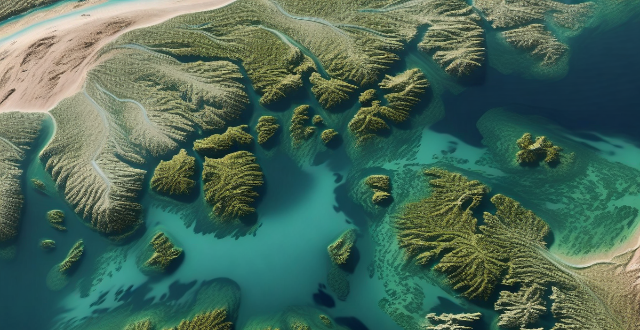Global warming is causing significant changes to travel destinations worldwide, including rising sea levels that threaten coastal areas and alter natural landscapes. Altered climates disrupt seasonal patterns and increase extreme weather events. Environmental degradation, such as desertification and drought, affects agricultural productivity and wildfire risk. Melting ice impacts glacier-based activities and fjord landscapes. Shifts in wildlife habitats due to changing biodiversity and coral reef bleaching also pose challenges. The tourism industry must adapt to these changes and promote efforts to mitigate global warming's effects.

Impacts of Global Warming on Travel Destinations
Global warming, a long-term increase in Earth's average surface temperature, has far-reaching consequences that extend to various sectors including tourism. The changes induced by global warming can significantly affect travel destinations in numerous ways. Here are some key impacts:
Rising Sea Levels
*Submersion of Coastal Areas*
The melting of polar ice caps and glaciers due to increased temperatures leads to rising sea levels. This phenomenon poses a threat to coastal areas and islands, which are popular tourist attractions.
- Loss of Habitat and Tourist Infrastructure: Coastal habitats like mangroves and coral reefs, which are often major attractions for tourists, face destruction. Moreover, hotels and other infrastructure built close to the shore risk being submerged or damaged by more frequent and intense storm surges.
*Change in Landscape and Ecosystems*
The loss of coastlines alters natural landscapes and disrupts local ecosystems, potentially affecting the biodiversity that tourists come to see.
Altered Climates
*Disruption of Seasonal Patterns*
Traditional patterns of snowfall and rainfall are changing due to global warming, affecting seasonal tourism activities such as skiing, hiking, and wildlife viewing.
- Shorter Winter Seasons: Shorter periods of snow can reduce the ski season, impacting winter sports tourism.
- Unpredictable Weather: Unpredictable weather patterns can make it challenging for tourists to plan outdoor activities and may lead to cancellations or rescheduling of trips.
*Extreme Weather Events*
Increased frequency and intensity of extreme weather events like hurricanes, heatwaves, and heavy rainfall can disrupt travel plans and damage tourist attractions.
- Travel Disruptions: Flight delays and cancellations due to extreme weather can cause significant inconvenience for travelers.
- Damage to Heritage Sites: Intense rainfall and floods can cause irreparable damage to cultural heritage sites and historical landmarks.
Environmental Degradation
*Desertification and Drought*
Areas that become increasingly dry may lose their appeal as verdant landscapes turn into barren terrain.
- Reduced Agricultural Productivity: Decreased agricultural output affects local food supplies and cultural experiences related to farming that tourists may seek.
- Wildfires: Regions experiencing drought are at higher risk of wildfires, which not only destroy vegetation but also threaten human settlements and wildlife.
*Ice Melt and its Effects on Attractions*
The retreat of glaciers and reduction in ice sheets diminishes the allure of destinations known for their icy landscapes.
- Loss of Glacier-based Activities: Recreational activities like glacier trekking, dog-sledding, and snowmobiling are affected as the ice recedes.
- Alteration of Fjord Landscapes: As glaciers melt, fjords change shape, affecting both the visual appeal and ecosystems within these unique environments.
Shifts in Wildlife Habitats
*Changes in Biodiversity*
As temperatures rise, many species are migrating to cooler areas, which can alter the composition of local ecosystems.
- Disappearance of Iconic Species: Some destinations may no longer be able to advertise sightings of certain animals if they migrate to more hospitable climates.
- Potential for New Encounters: Conversely, some regions might start hosting new species, offering novel wildlife experiences for tourists.
*Coral Reef Bleaching*
Warmer ocean temperatures cause coral bleaching, affecting marine life and underwater ecosystems.
- Decline in Marine Biodiversity: With the decline of coral reefs, marine biodiversity suffers, reducing the appeal of diving and snorkeling spots.
- Tourism Economic Impact: The decline of coral reefs can have economic repercussions for coastal communities that rely on marine tourism.
In conclusion, global warming presents significant challenges for the future of travel destinations around the world. It is crucial for the tourism industry to adapt to these changes while also advocating for and implementing measures to mitigate the effects of global warming.